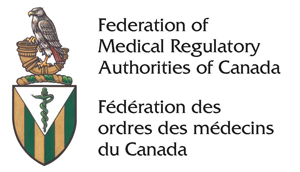Updated 7 December 2015
View the following document in PDF format.
Download the PDF document | Télécharger le document en PDF
Physician-assisted Dying
Guidance Document
Background
On February 6, 2015, the Supreme Court of Canada struck down the law prohibiting physician-assisted dying.[1] The court suspended that decision for 12 months. The effect of that decision is that, after February 6, 2016, it will not be illegal for a physician to assist a patient to die if:
In the absence of federal, provincial or territorial legislation related to physician-assisted dying, it falls to the medical regulatory authorities in Canada to develop standards or guidance for physicians within their provinces or territories.
Introduction
Following are the recommendations of the Advisory Group on Physician-Assisted Dying that was struck by the Federation of Medical Regulatory Authorities of Canada (FMRAC) in response to the aforementioned.
The purpose of this document is to provide recommendations that can be used as a resource by the medical regulatory authorities in Canada to develop standards or guidance for physicians within their provinces or territories if there is no legislation which governs physician-assisted dying. The Advisory Group acknowledges that a draft framework from the Canadian Medical Association (CMA) formed the basis for this document.
The Advisory Group recognizes that there may be legislation in future which addresses some of the matters addressed in this document. Where such legislation exists, the provisions of that legislation will take priority over the recommendations in this document if there is any inconsistency between the two.
The Advisory Group also acknowledges that each medical regulatory authority may choose to address the issue of physician-assisted dying in a somewhat different manner. For the purpose of this document, the Advisory Group has adopted the definition of physician-assisted dying from the Supreme Court’s decision in Carter v. Canada[2] as, “the situation where a physician provides or administers medication that intentionally brings about the patient’s death, at the request of the patient.”
Foundational Principles
Guidance or standards documents developed by the medical regulatory authorities in Canada should be based upon certain foundational principles, including:
Recommendations
Based on these aforementioned principles, the Advisory Group recommends the following for consideration by medical regulatory authorities in Canada if they choose to develop standards or guidance for physicians within their provinces or territories:
1.7 Documentation of Patient Wishes and Physician Assessment
1.8 Documentation Requirements – The Patient Record
[1] Carter v. Canada (Attorney General), 2015 SCC 5; https://www.canlii.org/en/ca/scc/doc/2015/2015scc5/2015scc5.html?resultIndex=1
[2] Ibid at para. 40
